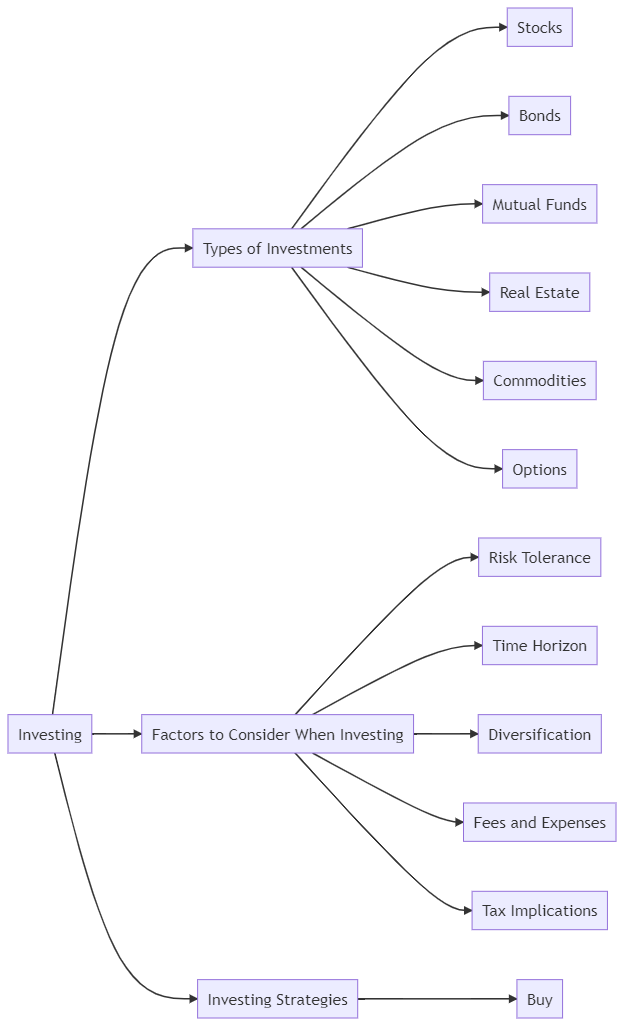
At David T Rosen, we understand that investing can be intimidating for many individuals. That’s why we’re here to help simplify the process by breaking down the basics of investing. In this article, we’ll cover everything you need to know to get started, from the types of investments available to the key factors to consider when making investment decisions.
What is Investing?
At its core value, investing involves putting your money to work to earn a return on your investment. This can be done in various ways, from purchasing stocks or mutual funds in exchange to investing in real estate or starting your own business with venture capital.
Types of Investments
Many different types of investments are available, each with unique characteristics and potential returns. Some common types of investments include:
- Stocks: Shares of ownership in a company
- Bonds: Debt securities issued by a company or government
- Mutual Funds: Pooled investments that invest in a variety of stocks, bonds, and other securities
- Real Estate: Investing in physical property, such as a rental property or commercial building
- Commodities: Investing in physical goods, such as gold or oil
- Options: Contracts that give the buyer the right to buy or sell an asset at a predetermined price
Factors to Consider When Investing
When making investment and business decisions, there are several factors to consider, for example, including:
- Risk Tolerance: How much risk are you willing to take on to potentially earn a higher return on your investment?
- Time Horizon: How long will you keep your investment before selling it?
- Diversification: Spreading your investments across a variety of asset classes and industries to reduce risk
- Fees and Expenses: The cost of investing, including commissions, fees, and expense ratios
- Tax Implications: The potential tax consequences of your investment decisions

Investing Strategies
There are a variety of different investing strategies that individuals can employ depending on their goals and risk tolerance. Some common strategies include:
- Buy and Hold: Purchasing stocks or other securities and holding onto them for the long-term
- Dollar-Cost Averaging: Investing a fixed amount of money at regular intervals, regardless of market conditions
- Value Investing: Investing in undervalued stocks with the potential for long-term growth
- Growth Investing: Investing in stocks with high growth potential, often in emerging industries
- Index Fund Investing: Investing in low-cost index funds that track the performance of a particular market index
Investor Wealth Management: Strategies for Achieving Financial Goals
At David T Rosen, we understand the importance of achieving your financial goals through effective investor wealth management. Whether you’re an experienced investor or just starting, our team of experts can help you create a customized strategy to own financial assets, maximize your returns, generate income, and minimize risks. In this article, we’ll explore some essential tools and techniques for successful investor wealth management and how you can use them to achieve your financial goals.
Develop a Plan that Fits Your Needs
The first step in effective individual investor wealth management is developing a plan that fits your needs. This involves assessing your financial situation, managing risk well, determining your goals, and identifying your best investment options. A financial advisor can help you create a customized plan for financial investors considering your current financial situation, risk tolerance, and investment objectives.
Diversify Your Portfolio
One of the essential strategies for successful investor wealth management is diversification. By spreading your investments across different asset classes, such as stocks, bonds, and real estate, you can reduce your risk and potentially increase your returns. A diversified portfolio can also help weather market downturns and protect your assets long-term.
Invest for the Long Term
Investing long-term is another critical strategy for successful investor wealth management. Instead of losing money by trying to time the market or chase short-term gains, institutional investors focus on building a portfolio that can generate consistent returns over time. This involves selecting investments that have a strong track record of performance, are well-managed, and have the potential for long-term growth.

Stay Disciplined and Stick to Your Plan
Another important aspect of effective investor wealth management is discipline. It’s important to stay focused on your goals and stick to your investment plan, even during market volatility. Avoid making emotional decisions based on short-term market fluctuations, for example, and instead, stay committed to your long-term strategy.
Regularly Review and Rebalance Your Portfolio
Finally, it’s essential to regularly review and rebalance your portfolio to ensure that it remains aligned with your goals and risk tolerance. This involves monitoring your investments, assessing their performance, and making adjustments as necessary. By staying vigilant and making adjustments as needed, you can help ensure that your portfolio stays on track and continues to generate the returns you need to achieve your financial goals.
Maximizing Returns and Minimizing Risks through Effective Investor Wealth Management
At David T Rosen, we understand that successful investor wealth management advice is crucial for achieving your financial goals. As a savvy investor, you’re aware that many factors influence good search rankings in financial markets, and quality of content is just one of them. That’s why we’ve created this article, focusing on the key strategies for effective investor wealth management to help you outrank other finance websites in Google.
Assess Your Financial Situation and Goals
First, the first step in developing an effective individual investor wealth management plan is assessing your financial situation and goals. This involves comprehensively examining your income, expenses, debts, and assets. Once you have a clear picture of your financial situation, you can set realistic goals that align with your priorities, such as projects such as retirement savings, buying a home, or starting a business.
Diversify Your Portfolio to Reduce Risk
Diversification is one of the essential strategies for successful investor wealth management. By spreading your investments across different asset classes, you can reduce your risk and potentially increase your returns. For example, a well-diversified portfolio of financial assets typically includes a mix of stocks, bonds, real estate, and alternative investments, such as pension funds, private equity, or hedge funds. This approach can help you weather market downturns and protect your assets’ long-term.

Invest for the Long Term
Another key strategy for effective investor wealth management is investing for the long term. While trying to time the market or chase short-term gains can be tempting, research shows that a long-term investment approach tends to generate the most consistent returns. Therefore, when selecting investments, focus on companies with a strong track record of performance, are well-managed, and have the potential for earnings and long-term profit growth.
Stay Disciplined and Stick to Your Plan
Discipline is another important aspect of successful investor wealth management. Staying focused on your goals and sticking to your investment plan, even during market volatility, is essential. Avoid making emotional decisions based on short-term market fluctuations and remain committed to putting money into your long-term strategy. You can achieve this by working with a trusted financial advisor who can help you stay on track and avoid common investment pitfalls.
Regularly Review and Rebalance Your Portfolio
Finally, it’s essential to regularly review and rebalance your portfolio to ensure that it remains aligned with your goals and risk tolerance. This involves monitoring your investments, assessing their performance, and making adjustments as necessary. By staying vigilant and making adjustments as needed, you can help ensure that your portfolio stays on track and continues to generate the returns you need to achieve your financial goals.
Investor Wealth Management: How to Achieve Long-Term Success
In investor wealth management, achieving long-term success requires a well-thought-out strategy that balances risk and returns. At [Your Company Name], we understand the importance and benefits of effective wealth management and have developed a comprehensive approach to helping you achieve your future financial goals.
Assess Your Risk Tolerance
Assessing risk tolerance is one of the first steps in developing an effective investor wealth management plan. This involves determining how much risk you will take to pursue potential returns. Your risk tolerance will depend on various factors, including age, financial goals, and overall financial situation. Once you understand your risk tolerance, you can develop a customized investment plan that aligns with your goals.
Develop a Diversified Portfolio
A well-diversified portfolio is a critical component of successful investor wealth management. By spreading your investments across different asset classes and sectors, you can reduce your risk and potentially increase your returns. A well-diversified portfolio may include stocks, bonds, real estate, and alternative investments, such as private equity or hedge fund and funds. By investing in a variety of assets, you can benefit from the growth potential of different markets and sectors while in high-risk investments minimizing your exposure to any one particular investment.

Invest for the Long Term
Investing long-term is another critical aspect of effective investor wealth management. While short-term stock market fluctuations can be stressful, a long-term investment approach can help you weather the ups and downs of the stock market, minimize risk, and potentially achieve greater returns over time. Therefore, when selecting investments, look for companies with a strong track record of performance and a history of generating consistent returns over the long term.
Regularly Rebalance Your Portfolio
Even a well-diversified portfolio requires regular monitoring and adjustment. As market conditions, and interest, change, your portfolio may become over or under-weighted in certain asset classes, which can impact your overall risk and return. Regularly rebalancing your portfolio ensures it aligns with your risk tolerance and investment goals. This may involve selling certain investments that have become over-weighted and investing your capital in new opportunities that offer additional risk and greater potential returns.
Work with a Trusted Advisor
Finally, working with a trusted advisor is essential for successful investor wealth management. An experienced advisor can help you navigate the complexities of investing and develop a customized investment plan that aligns with your goals and risk tolerance. Your advisor can also help you stay disciplined during market downturns and avoid common investment pitfalls.

Conclusion
Investing can be complex and intimidating, but it doesn’t have to be. By understanding the basics of investing and capital yourself, with knowledge of the different types of investments available, and the key factors to consider when making investment decisions, you can make informed decisions that will help you achieve your financial goals. We’re here to help you every step of the way.
CoopBusiness is a revolutionary cooperative business-building platform that empowers individuals to become entrepreneurs, business owners, and financially independent.
As a member, you’ll receive top-level business mentorship, access to our proprietary business systems, and the opportunity to access the funds you want to turn your business ideas into reality.